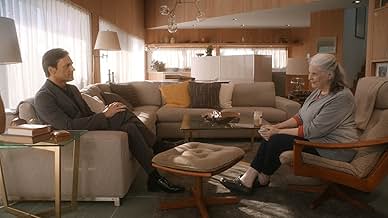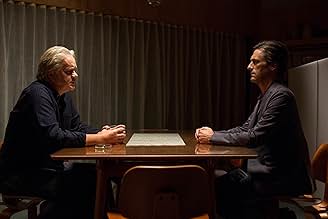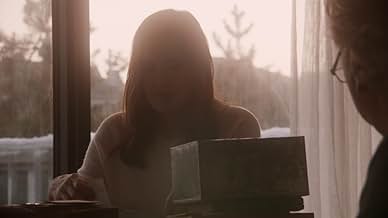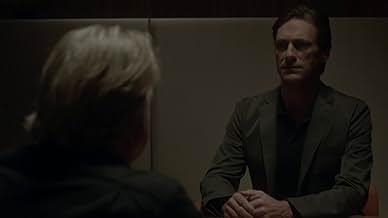ÉVALUATION IMDb
6,3/10
7,1 k
MA NOTE
Un service fournissant des reconstitutions holographiques d'êtres chers décédés permet à une femme de se retrouver face à face avec la version plus jeune de son défunt mari.Un service fournissant des reconstitutions holographiques d'êtres chers décédés permet à une femme de se retrouver face à face avec la version plus jeune de son défunt mari.Un service fournissant des reconstitutions holographiques d'êtres chers décédés permet à une femme de se retrouver face à face avec la version plus jeune de son défunt mari.
- Director
- Writers
- Stars
- Prix
- 2 victoires et 9 nominations au total
India Reed Kotis
- Young Tess
- (as India Kotis)
Hana Colley
- 2nd Generation Marjorie, Age 10
- (as Hana May Colley)
Lois Smith
- Marjorie
- (voice)
Bill Walters
- Old Jon
- (as W.A. Walters)
Marshall Axt
- Art Museum Gallery Visitor
- (uncredited)
Avis en vedette
Its a good concept that delivers an interesting movie about love, memories, regret and secrets. The film lives from its wonderful cast who are all very well picked and delivered good performance, however it suffers from its rather weak direction by Michael Amereyda who tried to make it too artsey for its own sake. Lois Smith delivers a great and charming performance. And I am glad she got some material to work with actually instead of just second hand supporting roles as usual. She really got talent and gave her role a lot of good and interesting facettes. Another great performance came from Geena Davis. One of her best recent performances. Davis really understood her role, which surely wasn't easy and the audience was easy to care for it, at least I did. Tim Robbins was also fine and did have some good and difficult moments. Also not a bad performance by Jon Hamm who might have had the most difficult role but mastered it well enough, even if he appeared a bit wooden, which was intentionally. But what was it with that annoying score/soundtrack? That really played the movie down which is a shame. It had a lot of potential but they tickled the wrong ankles at times. Too bad. Still worth to see for the performances.
If you like great theatre, which is more about great dramatic performances than about special effects and soundtracks, you'll have to appreciate this film, as it features what may be the greatest dramatic performances by Geena Davis and Tim Robbins to date, and brilliant work by Lois Smith and Jon Hamm that does not deserve to go unnoticed.
The very original writing delves into the human experience, into aging, and into the role technology will likely increasingly play in the human experience.
I have a feeling that this is one of those films that will go under-noticed and under-appreciated, but will some day receive a lot of attention for it's prophetic technological implications.
For anyone who has ever suffered a profound loss, this film may have special meaning, beyond the introspective insight that it's likely to inspire in any human being. The story is at times funny, curious, and also sad, without relying on cheap underinvested plot devices or well-timed musical themes to trigger emotional responses.
The very original writing delves into the human experience, into aging, and into the role technology will likely increasingly play in the human experience.
I have a feeling that this is one of those films that will go under-noticed and under-appreciated, but will some day receive a lot of attention for it's prophetic technological implications.
For anyone who has ever suffered a profound loss, this film may have special meaning, beyond the introspective insight that it's likely to inspire in any human being. The story is at times funny, curious, and also sad, without relying on cheap underinvested plot devices or well-timed musical themes to trigger emotional responses.
This film tells the story of a family who uses a technology to bring back their deceased relatives using an interactive holographic technology.
The first ten minutes of "Marjorie Prime" is interesting, especially when the nature of the man is revealed. However, the remainder of the film is just boring talks. They talk for a long time at length, and nothing comes out of the conversations. Nothing happens in the film, except an increasing number of holographic images. I don't get the point of the story.
The first ten minutes of "Marjorie Prime" is interesting, especially when the nature of the man is revealed. However, the remainder of the film is just boring talks. They talk for a long time at length, and nothing comes out of the conversations. Nothing happens in the film, except an increasing number of holographic images. I don't get the point of the story.
Being based on a play shouldn't be a detrimental factor in a movie but when it's played like a play, it kinda defeats the purpose of making a film. This one really had the feel of a stage play, done by a small theatre group in a suburban small town theatre company. It did impact a very interesting idea negatively. The film making process added very little to it to help give the story impact.
There were some very interesting ideas raised in the film but they were almost lost in the flat delivery. people talking on a stage. undermines the show don't tell aspect of film.
"The future will be here soon enough, you might as well be friendly with it." Marjorie (Lois Smith)
Of my many blessings, memory is not the precise gift of most of my friends. I do excel at giving my impressions rather than facts, a talent itself not always impressive. The slow-moving but serious sci-fi drama, Marjorie Prime, treats a time in the near future when holograms can be created to simulate the presence of loved ones who have died.
As in Spike Jonze's Her, technology is friend and foe at the same time. Such a hologram re-creation is fraught with problems, not the least of which is supplying the creation with accurate memories. Those are as imperfect as William James predicted in his repetitive-copying description, where memories leave accuracy behind with each re-recollection.
This film, an adaptation of Jordan Harrison's Pulitzer nominee, starring Lois Smith in the titular role of an 85 year old calling forth her former husband as a middle-aged man, gently makes that point with the hologram, Walter (Jon Hamm). It asks for information or clarification, moments that break the intimacy spell to remind the living that their loving creations are just that: "I'll remember that now," says stoic, affectless Walter.
Director/writer Michael Almereyda takes the Walter hologram into a static interpretation that belies the humanity and emphasizes the robotic nature of the creation. Emotion is missing, that ineffable element of loving so more important than the physical. In that regard the film succeeds in showing the second-rate nature of remembering facts when juxtaposed with emotion. As an imperfect memorist, I feel much better.
The placid sea-side setting, shot in muted color on Long Island, with the water as emblem of the fluid nature of memory, is effective for relaying the elusive nature of that faculty: "The stream of thought flows on; but most of its segments fall into the bottomless abyss of oblivion. Of some, no memory survives the instant of their passage. Of others, it is confined to a few moments, hours or days. Others, again, leave vestiges which are indestructible, and by means of which they may be recalled as long as life endures." William James
Although Marjorie interacts with more than one hologram (certainly most lives have layers of past loved ones to be recalled if needed), the film accomplishes making us aware of the complex business of remembering, its imperfection, and its reflection of our own uncertain place in the memory of humanity.
Of my many blessings, memory is not the precise gift of most of my friends. I do excel at giving my impressions rather than facts, a talent itself not always impressive. The slow-moving but serious sci-fi drama, Marjorie Prime, treats a time in the near future when holograms can be created to simulate the presence of loved ones who have died.
As in Spike Jonze's Her, technology is friend and foe at the same time. Such a hologram re-creation is fraught with problems, not the least of which is supplying the creation with accurate memories. Those are as imperfect as William James predicted in his repetitive-copying description, where memories leave accuracy behind with each re-recollection.
This film, an adaptation of Jordan Harrison's Pulitzer nominee, starring Lois Smith in the titular role of an 85 year old calling forth her former husband as a middle-aged man, gently makes that point with the hologram, Walter (Jon Hamm). It asks for information or clarification, moments that break the intimacy spell to remind the living that their loving creations are just that: "I'll remember that now," says stoic, affectless Walter.
Director/writer Michael Almereyda takes the Walter hologram into a static interpretation that belies the humanity and emphasizes the robotic nature of the creation. Emotion is missing, that ineffable element of loving so more important than the physical. In that regard the film succeeds in showing the second-rate nature of remembering facts when juxtaposed with emotion. As an imperfect memorist, I feel much better.
The placid sea-side setting, shot in muted color on Long Island, with the water as emblem of the fluid nature of memory, is effective for relaying the elusive nature of that faculty: "The stream of thought flows on; but most of its segments fall into the bottomless abyss of oblivion. Of some, no memory survives the instant of their passage. Of others, it is confined to a few moments, hours or days. Others, again, leave vestiges which are indestructible, and by means of which they may be recalled as long as life endures." William James
Although Marjorie interacts with more than one hologram (certainly most lives have layers of past loved ones to be recalled if needed), the film accomplishes making us aware of the complex business of remembering, its imperfection, and its reflection of our own uncertain place in the memory of humanity.
Le saviez-vous
- AnecdotesBased on the stage play of the same name. Lois Smith reprises her role as Marjorie, having previously appeared in two productions of the play.
Meilleurs choix
Connectez-vous pour évaluer et surveiller les recommandations personnalisées
- How long is Marjorie Prime?Propulsé par Alexa
Détails
- Date de sortie
- Pays d’origine
- Sites officiels
- Langue
- Aussi connu sous le nom de
- Марджорі Прайм
- Lieux de tournage
- sociétés de production
- Consultez plus de crédits d'entreprise sur IMDbPro
Box-office
- Brut – États-Unis et Canada
- 180 608 $ US
- Fin de semaine d'ouverture – États-Unis et Canada
- 20 668 $ US
- 20 août 2017
- Brut – à l'échelle mondiale
- 213 858 $ US
- Durée
- 1h 39m(99 min)
- Couleur
- Mixage
- Rapport de forme
- 1.85 : 1
Contribuer à cette page
Suggérer une modification ou ajouter du contenu manquant































